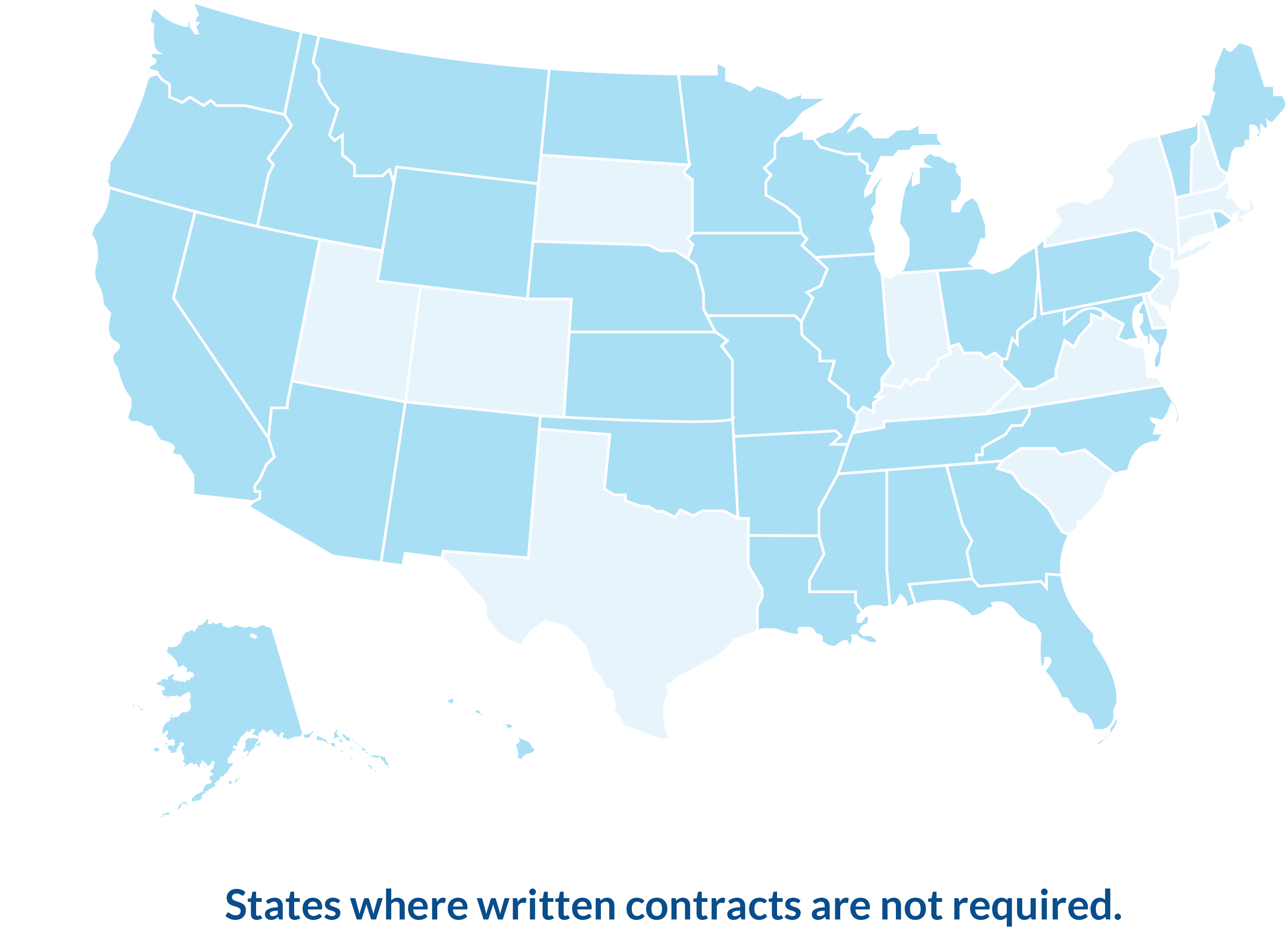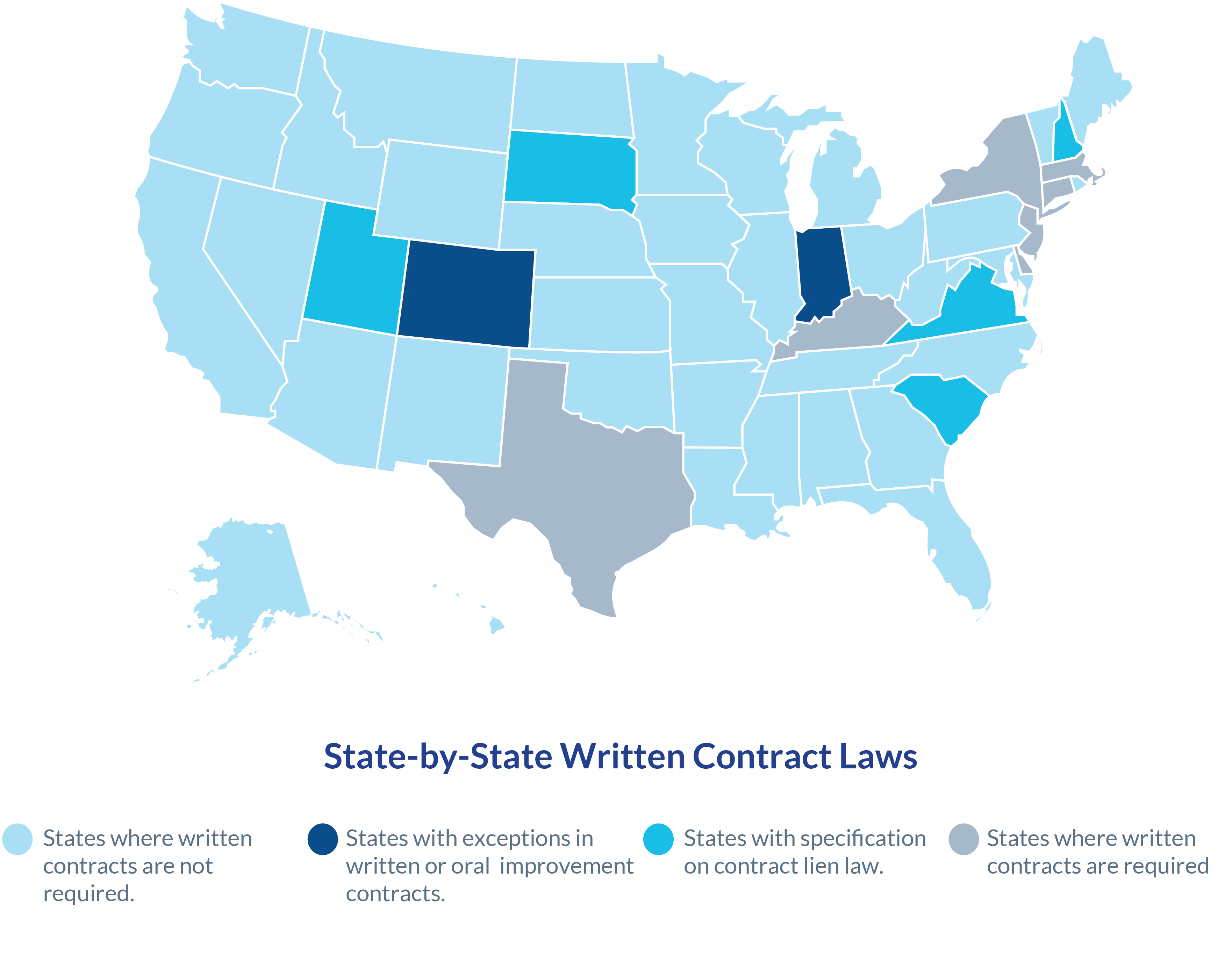

The following question pops up frequently on construction projects: “Can I file a lien even though I don’t have a written contract?” And, as with most of the questions we get about mechanics lien rights, the answer is: it depends.
Handshakes and verbal agreements are common in the construction industry, but finding answers on how lien rights apply to contracts that are not written and signed can be a challenge. We’ve collected the relevant information from all 50 states’ mechanic’s lien statutes and compiled it here to make this question easier to answer.
 States where written contracts are not required" width="3078" height="2216" />
States where written contracts are not required" width="3078" height="2216" />
In most states (37 of them), contractors and suppliers are generally allowed to file a lien even if they don’t have a written contract. In other words, the contractor could be working off on a verbal agreement, and yet still have the ability to file a lien claim.
Even though these states may permit a construction business to claim a mechanics lien even without a written contract, it is best practice to have a signed written contract for work provided. Documentation is crucial in the construction industry, and many times, what a party has documented is more important than what actually happened!
These statutes typically use language like “for the specific contract or agreed upon change” (New Mexico) and “contract means an agreement that provides for all or part of a work or improvement” (California) to describe contracts, and do not explicitly require that contracts must be written.
However, as explored with a situation in Ohio, not having a written contract can really clutter issues and create a sticky mechanics lien dispute.
These states typically permit parties with verbal, oral, or even implied contracts to claim lien rights. Be sure you familiarize yourself with the specific rules in the state you’re working in. Click on your state in the list to view each mechanics lien statute in full.
 States where written contracts are required." width="3078" height="2216" />
States where written contracts are required." width="3078" height="2216" />
In these states, a written contract between the party providing work and the hiring party is an absolute necessity in order to secure lien rights. Contractors, suppliers, and other parties can only claim a mechanics lien for funds mentioned in written contracts. If it’s not in writing…then you don’t have lien rights! Simple as that. Here are the states that require a written contract to file a lien:
*In New York, failure to have a written contract on a home improvement project may block the ability to enforce a filed lien.
**In Texas, the prime contractor must have a written contract with the owner(s) in order for anyone on the project (contractors, subs, suppliers, etc.) to file a mechanics lien against residential homestead projects. Further, architects, engineers, surveyors, and landscapers need to have written contracts for all projects.

Texas rules for mechanics liens and notices are subject to major changes in 2022.
The information on this page has already been updated to reflect the new rules.
There are three states — Arizona, Colorado, and Indiana — that require written contracts sometimes, depending on the value of the work being performed, or the type of work being performed. Contract requirements in these states have more to do with the type of work being provided or the type of project, rather than with the actual form of the contract itself.
Some state laws don’t make this question easy because they aren’t specific about whether or not contracts must be written in order for a contractor or supplier to file a lien. Oral contracts are typically valid so long as they adhere to the state’s rules on contracts, but companies should consult with a lawyer if they questions about a specific situation and don’t have a clearly defined written contract.
Here are some example questions and answers about the “written contract” requirement in some of these states.
This question is interesting because it presents a twist to the “written contract” discussion. The question here is really about “privity of contract,” and not whether the contract is written or verbal. This question appears to come from a homeowner who didn’t contract with a subcontractor at all. As such, the subcontractor doesn’t have a “written contract” with the owner. In fact, the subcontractor doesn’t have any contract with the owner — neither written nor verbal!
However, presuming the subcontractor has a contract with the general contractor (or someone!) on the job, the subcontractor will have lien rights in this case. And since this project is in Arizona, and we know Arizona doesn’t require contracts be in writing, this sub would have lien rights even if the contract was just an oral agreement.
A very similar question was asked about a Texas situation…and as we saw above, Texas does require contracts be in writing. However, presuming that the subcontractor on the project has a written contract with someone, they can still file a lien even if they don’t have a written agreement with the property owner.
Another important question that needs to be answered is what constitutes a “contract?” You have some stuff in writing, but is it actually a “contract?” Where is the line drawn?
This is a common question and one that came up on our Expert Center when a material supplier asked, Do purchase orders count as a contract? To answer this question, the construction attorney went into the legal requirements to form a contract. These can be really sticky requirements, and it’s not always clear. Ultimately, the answer concluded, a purchase order may ultimately create a contractual relationship between the parties if all the required elements are present.
So, even in states that require written contracts…something you have in writing may qualify for as the “contract,” even if it is not explicitly marked as a contract. As long as the essential requirements for a contract are met, even a string of text messages could potentially result in a binding contract.
Another common question that arises in this “written contract” category is about changes to the work. It’s super common that changes to the contract and to the work occur throughout the course of a construction job. And with the speed of construction, these changes frequently don’t get neatly documented. Extra work will get approved orally, or a change may be demanded without even agreement! What happens then? Do change orders need to be writing for lien rights, too?
This came up on our Ask an Expert Center with this question related to a Texas project: Can I file a lien on extra work for which I don’t have written authorization?
The answer provided, and the general answer to provide is that if the written contract requirement is satisfied and there is a written contract in place, changes and authorized work may still be subject to a lien, even though a second contract wasn’t executed. The changes themselves, in other words, are actually done under and within the original contract.

We're the mechanics lien experts. We offer forms made by attorneys and trusted by thousands.

It’s always a good idea to get a written contract to ensure a smooth payment process and to minimize risk. Regardless, in several states, oral agreements (or even implied ones) are more than sufficient to secure lien rights. This article is meant to give a general overview of the requirements as a jumping-off point for those curious about whether or not it is necessary to have a written contract in order to secure mechanics lien rights.

Can a lien be filed without a written contract? This post explains when verbal agreements are enough, when it must be in writing, and when it's unclear!